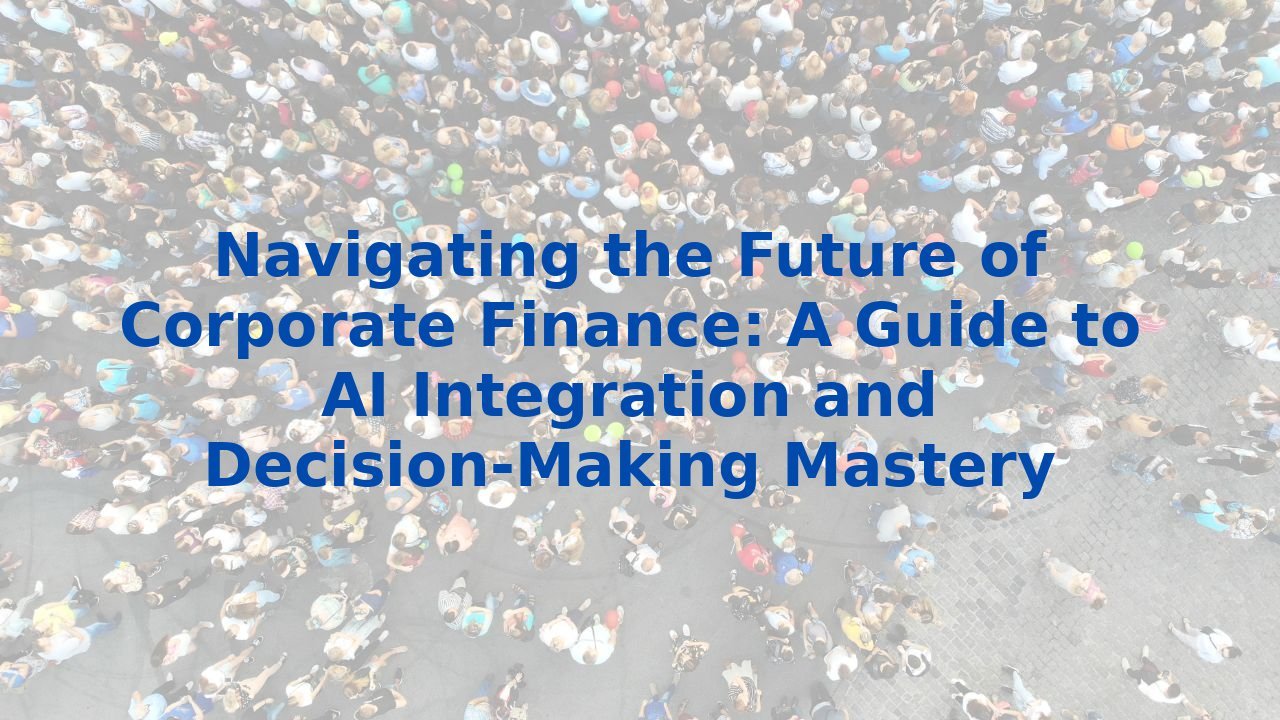Navigating the Future of Corporate Finance: A Guide to AI Integration and Decision-Making Mastery
Navigating the Future of Corporate Finance: A Guide to AI Integration and Decision-Making Mastery
As we stand on the precipice of a new era in corporate finance, the importance of informed financial decision-making cannot be overstated. With the rapid advancement of technology, stringent compliance dictates, and cutthroat market dynamics, the challenges faced by professionals in this field are ever-growing. Enter Artificial Intelligence (AI)—a transformative force that promises to redefine the landscape of corporate financial management and accounting.
Automation and Efficiency
At the forefront of AI’s impact is its unparalleled ability to automate repetitive and labor-intensive tasks. Financial analysts traditionally devote hours poring over vast volumes of data to search for anomalies and compile reports. AI changes this narrative by executing these tasks quickly and with remarkable accuracy. Imagine receiving critical financial insights in mere minutes, rather than days. This newfound efficiency liberates valuable human resources, allowing professionals to pivot their focus toward higher-value activities. Tasks like strategic planning, innovation, and revenue-generating initiatives become the new frontier for finance teams ready to harness AI’s full potential.
Predictive Analytics and Decision-Making
Moving beyond just automation, AI leverages the power of predictive analytics to aid in decision-making. By analyzing colossal datasets, AI systems can unveil hidden patterns and offer credible forecasts. Such capabilities empower finance professionals to make data-driven choices, reducing uncertainty in forecasting future demand, supply changes, or market trends. The insights gained from predictive analytics transition finance from a reactive posture to a proactive one, enabling organizations to navigate challenges and seize emerging opportunities with confidence.
Data Analysis and Risk Management
In the world of corporate finance, sifting through data can often lead executives astray, wasting precious time on non-essential metrics. Here, AI acts as a compass—it can effectively filter out the noise and spotlight relevant information, which enhances the accuracy of financial decisions. Furthermore, by providing a streamlined approach to data analysis, AI significantly aids risk management, reducing the chances of decision-making based on incomplete insights. This targeted analysis is invaluable, particularly during volatile market conditions when every data point counts.
Fraud Detection and Prevention
The integration of AI also enhances the robustness of audit processes. By compiling and analyzing aggregated data from diverse sources, AI can identify discrepancies and red flags that human auditors might overlook. This vigilance in fraud detection and prevention ensures that organizations maintain integrity in their financial reporting and compliance efforts, thereby minimizing the risk of audit failures. Trust is the cornerstone of corporate finance, and AI fortifies that trust with unprecedented analytical depth.
Strategic Forecasting and Planning
AI’s predictive prowess isn’t confined solely to operational efficiencies; it extends into strategic planning and forecasting as well. Finance teams can now utilize advanced machine learning algorithms to model various business scenarios and assess the potential impacts on cash flow, budget allocation, and overall financial health. This empowers businesses to plan with confidence, offering clarity in resource allocation and strategic decision-making.
Training Employees for AI
While AI’s capabilities are profound, it’s crucial to remember that it’s not a replacement for human intelligence. The true synergy happens when finance professionals understand how to work in tandem with AI technologies. Therefore, investing in training programs that enhance employees’ skills in statistics, model building, and basic machine learning can dramatically influence the effectiveness of AI integration. Such training initiatives ensure your finance teams can navigate complex AI tools readily, galvanizing the organization toward achieving a seamless transition into a digitally transformed future.
Conclusion
The integration of AI in corporate finance is not just a trend—it's a transformation that stands to revolutionize the industry. By automating tedious tasks, employing predictive analytics for informed decision-making, enhancing data analysis, and bolstering risk management, AI offers robust solutions to the contemporary challenges of financial management. Embracing this technological evolution, while continuously educating finance professionals, will empower organizations to unlock unprecedented levels of productivity and strategic value. As we look to the future, those who adapt and invest in this AI revolution will undoubtedly lead the pack, driving innovative growth and creating substantial value in an ever-changing landscape.
"The greatest danger in times of turbulence is not the turbulence; it is to act with yesterday’s logic." – Peter Drucker
For organizations keen on navigating this future with confidence, investing in comprehensive AI training for their teams is the first step toward harnessing the transformative power of this technology. Explore more about how to prepare your workforce for this shift, paving the way for a sustainable corporate finance environment.



